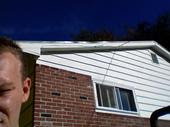
That pear I was carrying around for 2 weeks maybe in the pocket of my backpack finally ripened—I ate it today before plant lab, in a hurry.
glow of the smile-shaped paper activity

the brick of meaning, the brick of money, you want to muss up their hairif he says Do not hasten to bid me adieu he's not a cowboy
HighwaysignWrapped inburlapIt meansNothing
Poetry, that must touch the stringfor music's serviceis of violence and obedience a delicate balancing.
My heart despairs. For the poembeyond all poetry I have actually heardhas words as natural and expendableas a cold stream of the first waterthru which rocks of my resistant lifeyield to light cleavages of what seems true,white heights and green deeps.
The structure of rime is in the rigorous trees repeated that take on the swirl visible in the coast winds and the outcroppings, the upraised and bared granites that define sentences of force and instrument.
These feelingsare imaginary.These feelingsare imagesof things.These thingsare feltas real.These thingsare imaginedas real,"head andneck, faceand eyes,arms, fingers,nipples andhips." Theseimaginings containno ideas.
The hebrew word araphel means"thick darkness, secret or high place."But there is no such thing as obscurepoetry. The objects of a poemare as bright and clear as can be.The boast that itswords come from the heartis true of each real poem, eachword written in blood.Who wants to look at a colorso bright it hurts the eyes?With an elevated serum nitrogen levelat above 12,000 feet,Tibet favors a mix ofbright reds and yellows.Red stands for raging energy,yellow for light.. . .On the Williamsburgat 1:15 of an afternoon on Sunday,April 17th, a sunny day,60 degrees with a light breeze,I counted fourteen flattenedPrince's Plastic Weld glue tubes;two syringes, one withand one without a point;countless broken pints, Smirnoff, Ron Rico, etc.;plus an intact Wild Irish Rose empty.
And the voice replied to him again and it was now so low and yet so searching that it was like a wind stirring the horns of snails and touching the hairs on the throats of night-jars, and moving the antennae of butterflies, and lifting the gold-dust from the cracks of puff-balls, and blowing the grey dust from the droppings of weasels, and rippling the brown rain-fall in the cups of fungi, and fretting the light scurf on the brittle skulls of the newborn, and the rheum-drops on the eyelids of extreme age, and the sweat-drops on the forehead of death.






Very many people have the feeling: “I can make a gesture here but that’s all.” One example is that you say of a certain phrase of music that it draws a conclusion, “Though I can’t say for my life why it is a ‘therefore’!” You say in this case that it is indescribable. But this does not mean that you may not one day say that something is a description. You may one day find the word or you find a verse that fits it. “It is as though he said: ‘. . .’,” and you have a verse. And now perhaps you say: “And now I understand it.”
. . .
The mistake seems to me in the idea of description. I said before, with some people, me especially, the expression of an emotion in music, say, is a certain gesture. If I make a certain gesture . . . “It is quite obvious that you have certain kinesthetic feelings. It means to you certain kinesthetic feelings.” Which ones? How can you describe them? Except, perhaps, just by the gesture.
Suppose you said: “This phrase in music always makes me make one particular gesture.” A painter might draw this gesture. A man, instead of making a gesture, would draw a gesture. “Wittgenstein, you talk as if this phrase gave you sensations you couldn’t describe. All you get is sensations in your muscles.” This is utterly misleading. We look up muscles in a book on anatomy, we press certain parts and give these sensations names, ‘A,’ ‘B,’ ‘C,’ etc. All that would be needed for a piece of music would be the description ‘A,’ etc., giving the sensations in each muscle.
The horizon is a second skin, seeingFrom “Index”:
Sheathed by being, swallowed whole.
It kings us eye for I. It brings what
Flings us far near, an myopia, a fat
Cataract where the ocean pours over
The edge into threshing, blent serrations, scales.
you can smoke anything: shoe leatherAnd from “Alarum and Moral”:
ethics, Nixon, Bastille Day, quiet.
Walking in Los Angeles is like dancing in wet cement.And:
The distances cheat. You make the city up.
Channels of light and dark symposium on squirm and offer
something glorious about to happen, a kind of art or tar
whose hardening a steady, moderate movement postpones.
Has it really gotten to the point where you can’t slice the monuments from
the moment without
taking off your fingerprints too?
